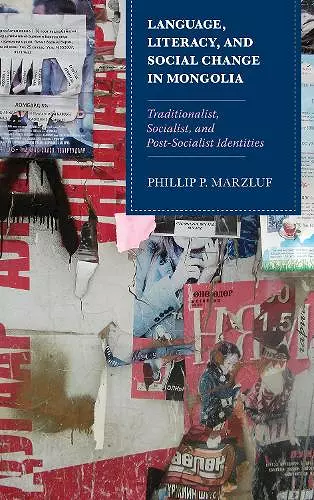Language, Literacy, and Social Change in Mongolia
Traditionalist, Socialist, and Post-Socialist Identities
Format:Hardback
Publisher:Lexington Books
Published:22nd Nov '17
Currently unavailable, and unfortunately no date known when it will be back

Language, Literacy, and Social Change in Mongolia is the first full-length treatment of literacy in Mongolian. Challenging readers’ assumptions about Central Asia and Mongolia, this book focuses on Mongolians’ experiences with reading and writing throughout the past 100 years. Literacy, as a powerful historical and social variable, shows readers how reading and writing have shaped the lives of Mongolians and, at the same time, how reading and writing have been transformed by historical, political, economic, and other social forces. Mongolian literacy serves as an especially rich area of inquiry because of the dramatic political, economic, and social changes that occurred in the twentieth and twenty-first centuries. For the seventy years during which Mongolia was a part of the communist Soviet world, literacy played an important role in how Mongolians identified themselves, conceived of the past, and created a new social order. Literacy was also a part of the story of authoritarianism and state violence. It was used to express the authority of the communist Mongolian People’s Revolutionary Party, control the pastoral population, and suppress non-socialist beliefs and practices. Mongolians’ reading and writing opportunities and resources were tightly controlled, and the language policy of replacing the traditional Mongolian script with the Cyrillic alphabet immediately followed the violent repression of Buddhist leaders, government officials, and intellectuals. Beginning with the 1990 Democratic Revolution, Mongolians have been thrust into free-market capitalism, privatization, globalization, and neoliberalism. In post-socialist Mongolia, literacy no longer serves as the center for Mongolian identity. Government subsidies to pastoral literacy resources have been slashed, and administrators now find themselves competing with other “developing countries” for educational funding. Due to the pressures caused by globalization, Mongolians have begun to talk about literacy and language in terms of crisis and anxiety. As global flows of English compete with new symbols from the distant past, Mongolians worry about the perceived lowering standards of Mongolian linguistic usage amid rapid economic changes. These worries also reveal themselves in official language policies and manifest themselves in the multiple languages and scripts that appear in the capital of Ulaanbaatar and other urban areas.
Phillip P. Marzluf provides a balanced and valuable analysis of the Mongolian socialist government’s policies and efforts to increase the rate of literacy, which had gradually begun to rise during the late nineteenth and early twentieth centuries. He shows that the government not only employed schools but also poster and street signs, posters, the oral tradition of poetry, and music in its literacy campaigns. Public health officials and the military were recruited to foster literacy. Although the government’s statistics were somewhat exaggerated, the increase in the numbers of Mongolians who could read and write was impressive. Marzluf then surveys the difficulties in promoting literacy in post-socialist Mongolia and describes the links between language and ethnic identity in modern Mongolia. -- Morris Rossabi, Queens College, City University of New York
Ethnographies of writing are a rare genre, and this book is an extraordinary instance of it. In this exceptionally rich and broadly contextualized study, Phillip P. Marzluf takes us to from the history of writing in Mongolia and the politics of literacy to the heart of writing as lived experience. -- Jan Blommaert, Tilburg University
Offering a different perspective on Mongolian life from twentieth-century socialism to twenty-first century democratic capitalism, Phillip P. Marzluf’s exposition on changing ideology and policy toward literacy weaves together literacy studies, anthropology, history, and current events. The result is a fascinating and highly readable account of the challenges Mongolians have overcome as they contended with different governments and outside pressures. -- Paula L. W. Sabloff, Santa Fe Institute
ISBN: 9781498534857
Dimensions: 239mm x 156mm x 20mm
Weight: 549g
234 pages